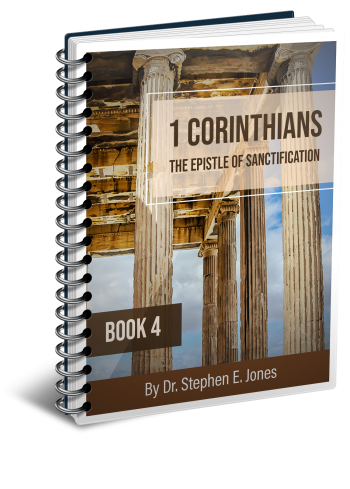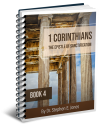Latest Posts
View the latest posts in an easy-to-read list format, with filtering options.

An in-depth commentary/study on chapters 14 through 16 of First Corinthians.
Category - Bible Commentaries

1 Corinthians 16:1, 2 says,
1 Now concerning the collection for the saints, as I directed the churches of Galatia, so do you also. 2 On the first day of every week let each one of you put aside and save, as he may prosper, that no collections be made when I come.
At the beginning of Paul’s letter, he had told the believers in Corinth that they had been “called into fellowship,” not only with Jesus Christ, but also with each other. For this reason, he was disturbed that there were divisions among them. Fellowship was being broken by the spirit of denominationalism.
Prominent among these divisions were the splits between Jewish believers and Greek believers. Paul was caught in the middle of this dispute, as his letters show.
The collection for the poor in the Jerusalem church was important, because it proved that Paul was not trying to split the church into Jewish and Gentile factions. It proved that Paul was not trying to set up his own denomination, but that he desired to remain in fellowship with all of the churches. This collection, then, was designed to express the unity between Greeks and Jews, according to the decision of the church council in Acts 15:9, saying,
9 and He made no distinction between us and them, cleansing their hearts by faith.
Elsewhere, in Eph. 2:14-16, Paul wrote that the dividing wall had been broken down in Christ, in order to “make the two into one new man, thus establishing peace.” The collection of money for the relief of the poor saints in Jerusalem was evidence of Paul’s desire for unity and equality between these two groups. For this reason the collection ought not to be thought of as a form of tribute, as if the Gentiles were expressing subservience to Jews.
Much of the employment in Jerusalem centered around temple observances, and many of the believers in Jerusalem probably found difficulty making a living. They may have experienced boycotts as well. Paul wanted them to know that their Greek brethren cared about them. Yet later, when Paul was arrested at the temple in Jerusalem, he defended himself in Acts 24:17, saying,
17 Now after several years I came to bring alms to my nation [ethnos] and to present offerings [at the temple].
No doubt he had given a customary offering at the temple as well, but the collection from the Greek churches went to the poor believers in Jerusalem. But Paul did not explain himself to the crowd that had rioted against him. He only explained that he had given alms to his own people (ethnos, “ethnic group”) and to the temple.
Paul’s desire for unity extended even to those who had rejected Christ. It pained him that the believers would have to separate themselves from Judaism and the temple worship. In fact, at the time Paul wrote his Corinthian letters (58 A.D.) Judaism and Christianity had not yet fully separated. That final separation began with the martyrdom of James, the bishop of Jerusalem in 62 A.D., followed by the destruction of the temple in 70 A.D.
The first day of the week was the normal day on which the believers met in their house meetings. So this was the most natural time for donations to be collected. This is consistent with the Didache, the earliest non-canonical Christian document (about 65 A.D.), where we read in chapter 14,
“On the Lord’s day of the Lord gather together and break bread and give thanks, adding confession of your sins, that your sacrifice may be pure.”
This term, “the Lord’s day,” was the common term for the Roman day of the week known as Sunday. The Jews called it either the first day or the eighth day. Ignatius of Antioch, a long-time disciple of John, was martyred about 113 A.D. He used the term, “the Lord’s day” to denote the day of Jesus’ resurrection.
“On the day of preparation, then, at the third hour, He received the sentence from Pilate, the Father permitting that to happen; at the sixth hour He was crucified; at the ninth hour He gave up the ghost; and before sunset He was buried. During the Sabbath He continued under the earth in the tomb in which Joseph of Arimathea had laid Him. At the dawning of the Lord’s day He arose from the dead, according to what was spoken by Himself, ‘As Jonah was three days and three nights in the whale’s belly, so shall the Son of man also be three days and three nights in the heart of the earth.’ The day of the preparation, then, comprises His passion; the Sabbath embraces the burial; the Lord’s Day contains the resurrection.” [Epistle to the Trallians, IX]
The Epistle of Barnabas XIII, 10, which was probably written about 115 A.D., though not by the biblical Barnabas, says,
10 For which cause [i.e., Christ’s resurrection] we observe the eighth day with gladness, in which Jesus rose from the dead; and having manifested himself to His disciples, ascended into heaven.
All of the early church writings show that the Christians commonly met on the first day of the week, or the eighth day, or the Lord’s day. So this was the logical time for them to collect the donations for the Jerusalem church.
We should also note that Paul wanted them to collect these donations ahead of time while he was not present. I suspect that he was uncomfortable with the idea of collecting offerings, for it was his custom to work during the day to support himself. And he did not want his presence to pressure anyone into giving more than “as he may prosper.” Some could give more, some less, and he did not want to know what each might give, lest it should alter the way he viewed them. Unfortunately, it is natural to favor large donors over smaller donors.
Paul continues in 1 Corinthians 16:3, 4,
3 And when I arrive, whomever you may approve, I will send them with letters to carry your gift to Jerusalem; 4 and if it is fitting for me to go also, they will go with me.
At this point in time, Paul was yet unsure who would deliver the alms to the Jerusalem church. He suggested that the Corinthian church may want to entrust one of the believers with this mission, or, “if it is fitting,” for Paul himself to go. We know, of course, that Paul himself later felt led to go personally to Jerusalem, though he did not go alone.
Paul’s present plan was to return to Corinth after first passing through Macedonia. He writes in 1 Cor. 16:5-7,
5 But I will come to you after I go through Macedonia, for I am going through Macedonia; 6 and perhaps I shall stay with you, or even spend the winter, that you may send me on my way wherever I may go. 7 For I do not wish to see you now just in passing; for I hope to remain with you for some time, if the Lord permits. 8 But I will remain in Ephesus until Pentecost; 9 for a wide door for effective service has opened to me, and there are many adversaries.
This plan is mentioned again in Acts 19:21,
21 Now after these things were finished, Paul purposed in the spirit to go to Jerusalem after he had passed through Macedonia and Achaia, saying, “After I have been there, I must also see Rome.”
Paul’s “wide door for effective service” in Ephesus ended abruptly, after his teaching caused his “many adversaries” to riot in the streets (Acts 19:28, 29). This was resolved in court, but Paul immediately set sail for Macedonia and Greece (Acts 20:1, 2). Spending three months in Greece (Acts 20:3), he was unable to return to Corinth before beginning his journey to Antioch and to Jerusalem.
Hence, his disclaimer, “if the Lord permits” (vs. 7) seemed to indicate that Paul sensed that his plans might not work out as he wished. He wanted to spend some time with them, perhaps the whole winter, rather than just come to pick up the donations and leave immediately. But this was not possible.
Some of the Corinthian believers were disappointed by his change of plans, so Paul explained his actions in his second letter, telling them in 2 Cor. 1:15-17,
15 And in this confidence I intended at first to come to you, that you might twice receive a blessing; 16 that is, to pass your way into Macedonia, and again from Macedonia to come to you, and by you to be helped on my journey to Judea. 17 Therefore, I was not vacillating when I intended to do this, was I? Or that which I purpose, do I purpose according to the flesh, that with me there should be yes, yes and no, no at the same time?
Paul was assuring the Corinthians that he was being led by the Spirit, not by the flesh or by fear. His plans had changed, and he could not stop at Corinth before heading toward Jerusalem. The donations, then, would have to be sent to him by one of the trusted believers.